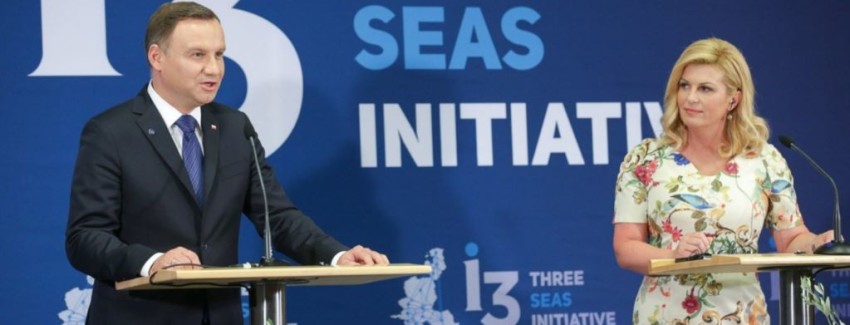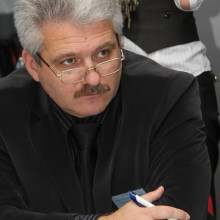The Three-Seas-Initiative
Problems, Potential and Prospects for Ukraine
Toni Michel
What is the Three-Seas-Initiative?
- A loose international cooperation forum sometimes also referred to as the Intermarium consisting of Austria, Bulgaria, Croatia, the Czech Republic, Estonia, Hungary, Latvia, Lithuania, Poland, Romania, Slovakia and Slovenia. The Grouping borders the Black, Baltic and Adriatic Seas. All, except Austria, are formerly communist countries.
- There are historical roots in the 19th century when the idea of such an alliance was floated to defend Central and Eastern Europe against both German and Russian imperialism.
- Three summits held so far in Dubrovnik (August 2016), Warsaw (July 2017) where US President Donald Trump attended and Bucharest (July 2018).
- The initiative so far has three central projects: a joint business forum, a north-south highway – the Via Carpathia from Lithuania to Greece – and liquefied natural gas infrastructure, with ocean terminals in Poland and Croatia and a connecting pipeline
Prospects of the Initiative
- There is little need or incentive to create a fully-fledged international organisation with separate institutions as today’s members are integrated into NATO (except Austria) and part of the EU Single Market.
- The group can be effective, however, in lobbying for regional interests within the EU and NATO. These include
- Strong defences against a resurgent Russia and a strong Transatlantic security link
- Context: Germany, France and the Benelux states are likely to focus on creating a more independent European foreign and security policy in the coming years and yet lack political will to integrate Ukraine, Georgia and Moldova
- Deeper regional military cooperation based on a shared threat assessment, strategic military culture and often even similar military hardware
- Oppose Nord Stream 2 and lower regional energy dependence on Russia
- Post-Brexit: keep the UK involved in regional security affairs and safeguard the rights of EU citizens in the UK
- Balance against an even stronger Germany in the EU after Brexit – the UK was long a strong ally of Eastern European states in Brussels
- Push back against any migrant re-settlement scheme from Brussels as member states reject multiculturalism and are sceptical of immigration from culturally-alien countries
- Take advantage of China’s Belt-and-Road Initiative and its sizable budget for infrastructure investment to realise energy and transport projects to open up the region and collectively bargain for a better deal with Beijing.
Problems and Obstacles
- Internal divisions and latent fears of Polish domination. More moderate states do not wish to be enlisted in Warsaw’s overtly anti-EU agenda. The result is an atomisation of multilateral initiatives instead of a joint approach:
- The Visegrad Four of Poland, the Czech Republic, Hungary and Slovakia is implicitly dominated by Warsaw
- a regional initiative of Austria, the Czech Republic and Slovakia to ‘balance’ against Visegrad already exists
- Ukraine and Moldova (in concert with Georgia) meanwhile attempt cooperation aiming at EU/NATO membership
- It is doubtful whether Hungary can still be considered part of the region’s anti-Moscow interest consensus given its open discontent with EU sanctions and increasing courtship of the Kremlin. Economically, Budapest has agreed to a number of non-transparent deals that include the construction of a nuclear power plant according to Russian designs and standards.
- Inter-state relations all over the region are highly vulnerable to sudden nationalist mobilisation over history and language that can quickly derail carefully-crafted cooperation
Ukraine and the Three-Seas-Initiative
- Aligning visions on defence, Russian aggression and the region’s economic interests towards the EU: namely labour mobility, taking advantage of structural adjustment funds, technical support and security guarantees.
- Regional integration offers Ukraine a ‘third way’ short of EU or NATO membership while still enhancing security, regional trade and cooperation.
- Ukraine is a security asset for regional military cooperation (29th in the world in military power and ahead of the Czech Republic, Hungary, Bulgaria, Romania, Sweden and Finland, among others) and has direct combat experience with regular Russian forces. The broader region is feeling under threat from Moscow and Kyiv is thus by far not only a ‘security recipient’ but also a ‘security provider’ for other countries by binding Russian attention and military forces.
- Regional law enforcement cooperation can help dry out cross-border smuggling and organised crime in Western Ukraine and – when coupled with energetic governance reforms and decentralisation – help bring large parts of the shadow economy back into legality – with added benefit for Kyiv in terms of taxes, legitimacy and loyalty.
Recommendations for Ukraine
- Launch a comprehensive initiative on military and political cooperation in the region, based on the joint interests outlined above
- Stress Ukraine’s role as a security provider for others; remind neighbours that Ukraine is currently binding enormous Russian military, intelligence and political resources in the Donbas that could otherwise be used against them
- Push for military cooperation and a mutual assistance clause between regional states; with different interpretations persisting among NATO countries over what constitutes an Article-5-style attack, regional states should come together and create an additional tripwire against Russian overt and covert intervention
- Test the waters for a regional quick reaction force that can work alongside all armies and will facilitate inter-operability and military-to-military contacts
- The Three-Seas-Initiative is most likely to succeed as a joint, cooperative project; however, it will certainly fail if it is perceived as a Polish-dominated grouping. Ukraine should comprehensively engage smaller countries like the Czech Republic, Slovakia and Croatia to address such concerns early on and develop joint institutionalised solutions – Kyiv should by no means focus its foreign policy resources only on relations with “big players” like Poland, Germany, France or the US
- Avoid the history and identity traps: develop potentially contentious policies on education, language and history in concert with neighbours and make an effort to explain measures extensively and proactively
- Implement recommendations by the International Crisis Group on governance reforms in Western Ukraine to enable more official economic exchanges and cross-border integration with western neighbours.
Contact the Author:
Twitter: @villageescape














